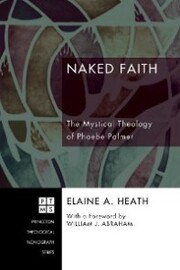Detailansicht
Naked Faith
eBook - The Mystical Theology of Phoebe Palmer, Princeton Theological Monograph Series
ISBN/EAN: 9781630877170
Umbreit-Nr.: 2289871
Sprache:
Englisch
Umfang: 136 S.
Format in cm:
Einband:
Keine Angabe
Erschienen am 01.01.2009
Auflage: 1/2009
E-Book
Format: EPUB
DRM: Adobe DRM
- Zusatztext
- Now and then through the history of the church a great light appears, a prophet who calls the church back to its missional vocation. These reformers are lovers of God, mystics whose lives are utterly given to the divine vision. Yet as Jesus noted, a prophet is often without honor among her own people. In the case of Phoebe Palmer (1807-1874), honor was lost posthumously, for within a few decades after her death her name all but disappeared. Palmer's sanctification theology was separated from its apophatic spiritual moorings, even as her memory was lost. Throughout most of the twentieth century her name was virtually unknown among Methodists. To this day the Mother of the Holiness Movement still awaits her place of recognition as a Christian mystic equal to Catherine of Siena, Teresa of Avila, or Therese of Lisieux. This book locates Palmer's life and thought within the great Christian mystical traditions, identifying her importance within Methodism and the church universal. It also presents a Wesleyan theological framework for understanding and valuing Christian mysticism, while connecting it with the larger mystical traditions in Catholic, Anglican, and Orthodox communions. While Palmer was a powerful revivalist in her own day, in many ways she could be the patron saint for contemporary Methodists who are drawn to the new monasticism and who long for the renewal of the church. Saint Phoebe is precisely the one who can help Methodists envision new forms of Christian community, mission, and witness in a postmodern world.
- Kurztext
- In Glory, Grace, and Truth, Alexander Tsutserov argues that three concepts of the revelation of God as Jesus are unfolded throughout the Gospel of John in terms of a ratification of the covenant of the presence of God. The covenantal aspects of &quote;glory,&quote; confirming the presence of God, are evident in Jesus: the visible appearance of God; the intrinsic character of God; the miraculous splendor of God (in Jesus's incomparable signs, deeds, wonders, and marvelous acts); and the divine honor of God (in the Son glorified by the Father). &quote;Grace upon grace&quote; alludes to the requests to confirm the presence of God. All believers gained the grace of the presence of God in Jesus, rather than Moses alone encountering the grace of the presence at Sinai. The Gospel of John depicts ratification of the covenant of the presence of God in Jesus according with the covenantal articles. &quote;Grace and truth&quote; alludes to Exodus 34:6. Each allusion in John depicts the full graciousness and integrity of God's character. The Son possesses and bestows the Father's character onto believers by means of the Holy Spirit, who is full of &quote;grace and truth.&quote; The divine character and the divine Law complement each other in believers, thus fulfilling the Scripture. In essence, the revelations of God at Sinai and in Jesus are the same. In quality, the latter surpasses the former in all three aspects: glory, grace, and truth.
- Autorenportrait
- Elaine A. Heath is Assistant Professor of Evangelism in the Perkins School of Theology at Southern Methodist University in Dallas, Texas. She is the author of<i>The Mystic Way of Evangelism</i>(2008).
